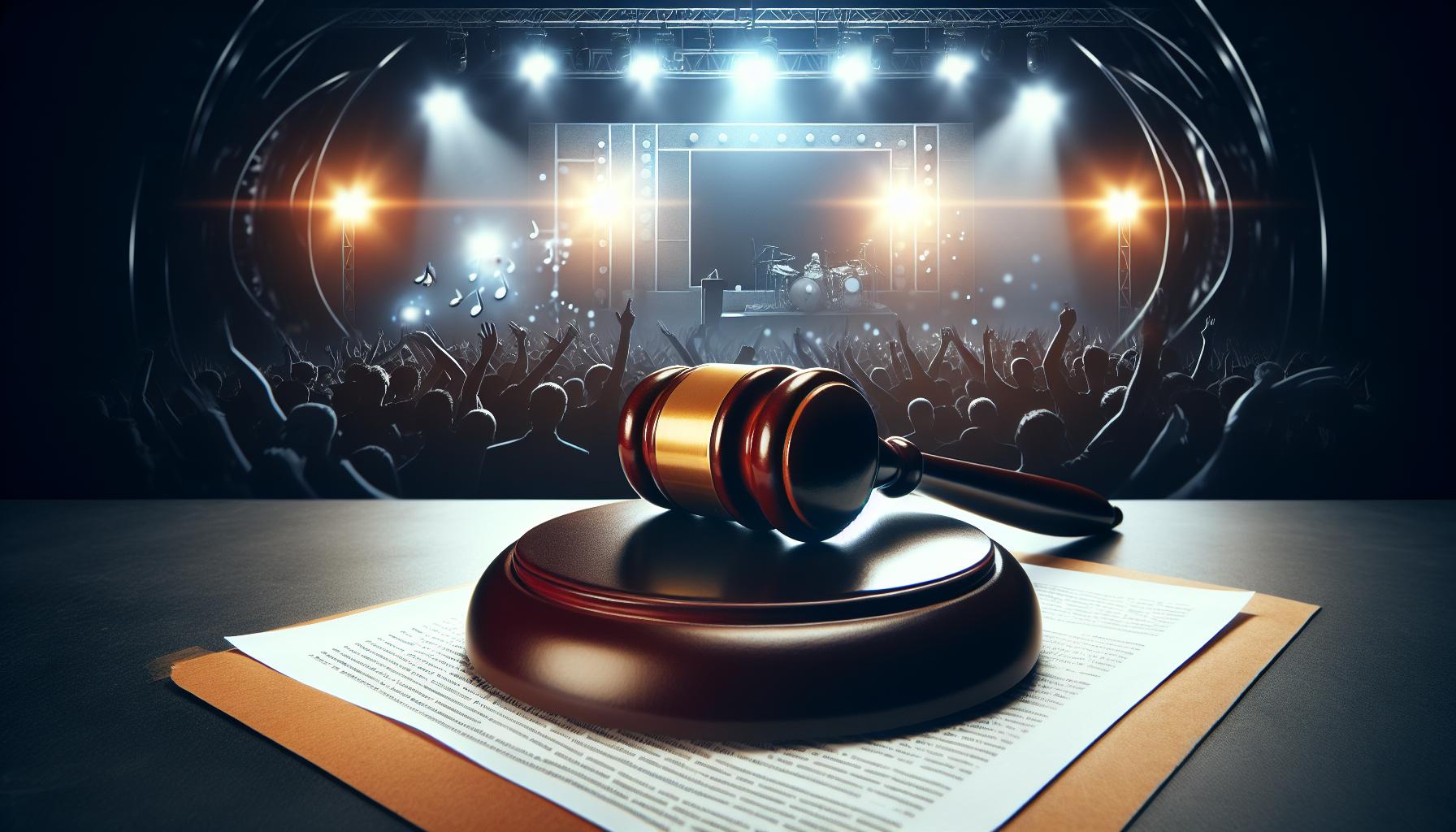Key Takeaways
- Staying informed about entertainment law is crucial for artists, producers, and industry professionals to protect their interests and adapt to changing trends.
- Recent legal developments, including high-profile lawsuits, highlight the importance of managing reputational risks and understanding legal implications in the entertainment sector.
- Emerging legislation, such as the Modern Copyright Act and the CASE Act, aims to enhance protections for digital content and simplify copyright enforcement for creators.
- Understanding the impact of streaming services on licensing agreements is vital for content creators to negotiate fair compensation while maintaining ownership rights.
- Continuous education through resources like industry newsletters, online platforms, and conferences helps professionals navigate the complexities of entertainment law effectively.
In the fast-paced world of entertainment, legal developments can shape careers and influence the industry at large. From high-profile lawsuits to groundbreaking legislation, entertainment law news is crucial for anyone navigating this dynamic landscape. Understanding these changes helps artists, producers, and executives protect their interests and stay ahead of the curve.
As new technologies and platforms emerge, the legal challenges evolve, making it essential for stakeholders to stay informed. Whether it’s copyright disputes, contract negotiations, or issues around intellectual property, the implications of these legal matters extend far beyond the courtroom. Keeping up with entertainment law news not only empowers professionals but also enhances their ability to adapt and thrive in an ever-changing environment.
Entertainment Law News
Current developments in entertainment law reflect the rapid evolution of the industry, especially regarding digital platforms and content distribution. Understanding these trends is essential for navigating the complexities of entertainment law.
Impact of Streaming Services on Legal Framework
Streaming services redefine traditional legal structures in the entertainment landscape. They necessitate new licensing agreements, altered distribution models, and unique revenue-sharing arrangements. Content creators often negotiate terms that ensure fair compensation while balancing exposure and ownership rights. The rise of exclusive contracts for streaming platforms may lead to legal disputes related to rights clearances and availability across different territories.
Changes in Copyright Regulations
Recent changes in copyright regulations significantly influence creators and rights holders. Revisions to guidelines enhance protections for digital content, including streaming works and user-generated videos. Increasingly stringent enforcement against piracy reflects efforts to secure intellectual property rights online. Music licensing reforms also aim to simplify the process for artists and vendors, promoting equitable access and reducing litigation risks associated with unauthorized use.
Notable Legal Cases in Entertainment

Recent legal cases in entertainment highlight ongoing challenges and shifts within the industry. These disputes often set precedents that affect not only the involved parties but also shape broader industry practices.
High-Profile Celebrity Lawsuits
High-profile celebrity lawsuits frequently capture public interest, showcasing the intersection of fame and legal rights. For example, the case of Johnny Depp vs. Amber Heard revolves around defamation claims following allegations of domestic violence. The court’s decision significantly impacted both parties’ careers and reputations, emphasizing the vital role of public perception in legal outcomes.
In another notable case, Taylor Swift vs. David Mueller addressed accusations of sexual assault, culminating in a jury ruling in favor of Swift. This case highlighted important issues related to consent and the power dynamics between celebrities and fans, potentially influencing how similar cases are approached in the future.
Music Industry Disputes
Music industry disputes often arise from copyright infringement and contract issues. The case of Ed Sheeran, who faced allegations of copying the song “Shape of You,” illustrated the complexities of music composition and copyright law. The settlement terms reflect a growing trend of negotiations that prioritize creative collaboration while addressing claims of infringement.
Another significant dispute involved Katy Perry in her case against Flame’s “Joyful Noise,” which raised questions about song similarity and originality. The outcome of this lawsuit demonstrated the challenges artists face when protecting their work, emphasizing the necessity for clear agreements and robust legal frameworks in the music industry.
These cases illustrate the complexities of entertainment law and the need for artists and producers to remain vigilant in protecting their rights amidst a rapidly evolving landscape.
Policy Changes Affecting Entertainment Law

Recent policy changes are shaping the landscape of entertainment law, impacting artists, producers, and legal practitioners. Following are key updates regarding emerging legislation and regulatory authority changes.
Emerging Legislation
New legislation is addressing several crucial issues in entertainment law. The Modern Copyright Act expands protections for digital content, emphasizing the importance of online rights management. This act enforces stricter penalties for copyright infringement, aiming to deter piracy in digital spaces. Meanwhile, the Copyright Alternative in Small-Claims Enforcement (CASE) Act simplifies the copyright enforcement process for small creators, allowing them to pursue claims in a more cost-effective manner.
Additionally, the Music Licensing Collective (MLC) emerged from the Music Modernization Act, providing a streamlined solution for digital music licensing. This initiative mandates that streaming services pay songwriters and publishers fairly, facilitating equitable compensation. These legislative changes signal significant shifts toward protecting creative rights in the increasingly digital entertainment environment.
Regulatory Authority Updates
Recent updates from regulatory authorities further impact entertainment law practices. The Copyright Office introduced revised guidelines focused on the registration processes for digital works, enhancing clarity and efficiency. These changes aim to reduce application backlogs and facilitate better access for creators seeking protections.
The Federal Communications Commission (FCC) is actively reviewing broadcast regulations, particularly concerning content distribution across emerging platforms. New regulations may incentivize greater compliance among streaming services and help maintain fair competition with traditional broadcasters.
Moreover, the Federal Trade Commission (FTC) is closely monitoring advertising practices within entertainment channels, particularly related to endorsements and sponsorships. They enforce stricter guidelines to prevent misleading marketing practices, which can affect how content is promoted and monetized.
These regulatory updates create an evolving environment for entertainment law, influencing how professionals navigate legal frameworks and protect their interests.
Key Takeaways for Industry Professionals

Staying updated on entertainment law developments is essential for industry professionals. These insights facilitate informed decision-making and proactive measures in dynamic legal landscapes.
Importance of Staying Informed
Understanding legal trends in entertainment law equips professionals with the knowledge to navigate complex regulations. Recent case law, such as Johnny Depp vs. Amber Heard, illustrates the high stakes of media and reputational concerns artists face. Keeping abreast of copyright reforms enhances creators’ abilities to protect their works effectively. Regularly reviewing updates on licensing agreements and contract standards ensures fair compensation is achieved in negotiations. Monitoring policy changes like the Modern Copyright Act helps industry stakeholders adapt to enforcement shifts, avoiding potential litigation and maintaining compliance.
Resources for Continued Education
Multiple resources exist for professionals seeking ongoing education in entertainment law. Online platforms such as the Entertainment Law Resource Center provide updates on crucial legal changes. Industry newsletters, like Variety and The Hollywood Reporter, deliver timely information on celebrity cases and legislative movements. Webinars and workshops hosted by legal experts offer in-depth explorations of specific legal topics. Additionally, specialized conferences, such as the American Bar Association’s Entertainment and Sports Law Conference, foster networking and knowledge-sharing among professionals. Utilizing these resources cultivates a deeper understanding of the law’s implications in the entertainment sector.
Rapid Changes in Legal Frameworks
Staying informed about entertainment law news is crucial for anyone involved in the industry. The rapid changes in legal frameworks necessitate a proactive approach to understanding emerging trends and challenges. As streaming services reshape traditional models and new legislation enhances protections, professionals must adapt their strategies accordingly.
Awareness of high-profile legal cases and recent policy changes can provide valuable insights into navigating this complex landscape. By utilizing available resources and continuing education opportunities, industry stakeholders can better safeguard their interests and ensure fair practices. Embracing this knowledge not only fosters resilience but also positions professionals for success in an ever-evolving environment.



